Adding to the great material Predictable Matt is posting…
I picked up a first issue of “Worlds of Fantasy” from 1968. Science fiction author Lester del Rey writes a short article on Tolkien and how he changed publishing attitudes towards fantasy in a few short years. And, by the way, Tolkien is working on a LOTR sequel and that could be a three volume novel, too.
Added bonus, the cover art is by Jack Gaughan.
I picked up a first issue of “Worlds of Fantasy” from 1968. Science fiction author Lester del Rey writes a short article on Tolkien and how he changed publishing attitudes towards fantasy in a few short years. And, by the way, Tolkien is working on a LOTR sequel and that could be a three volume novel, too.
Added bonus, the cover art is by Jack Gaughan.
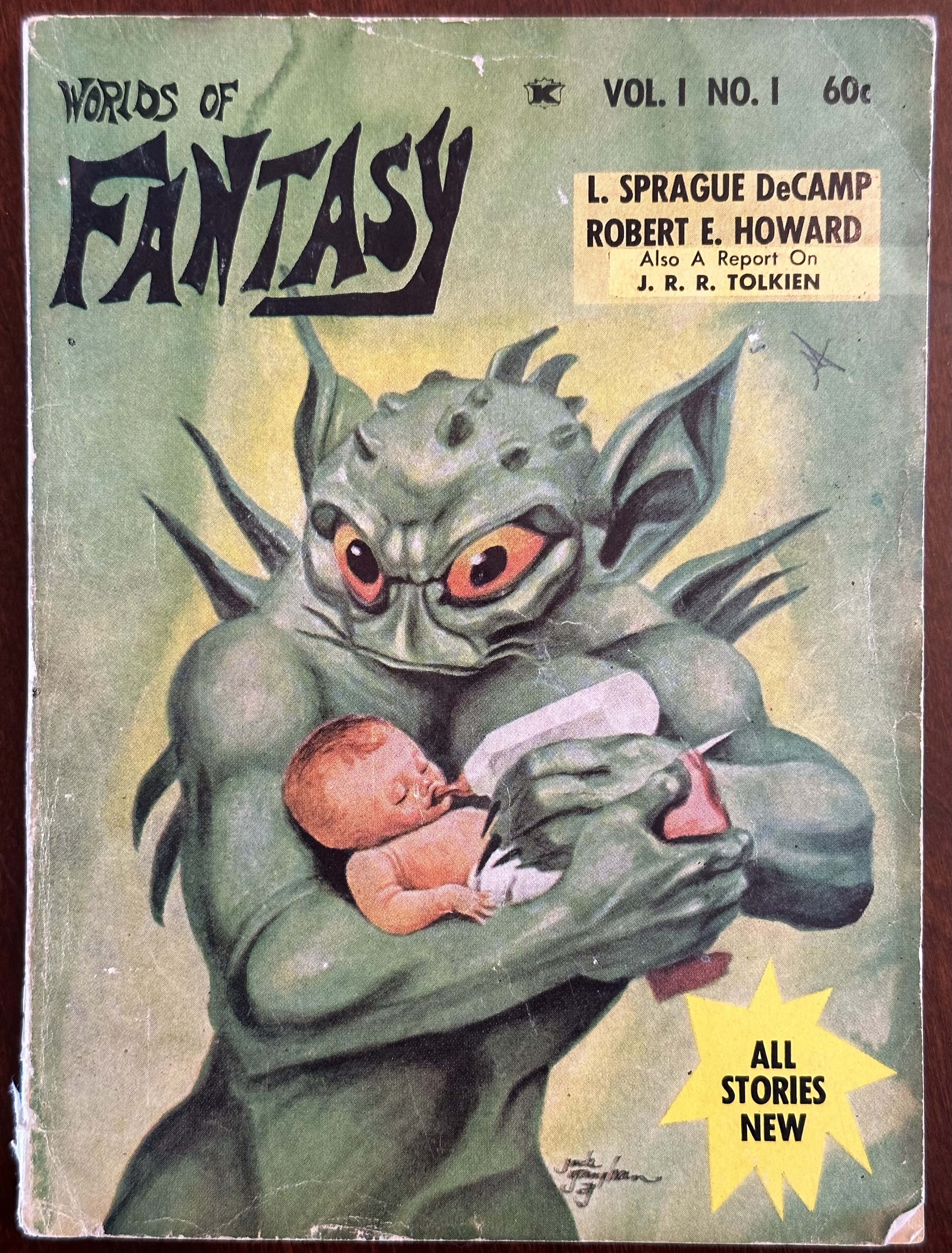
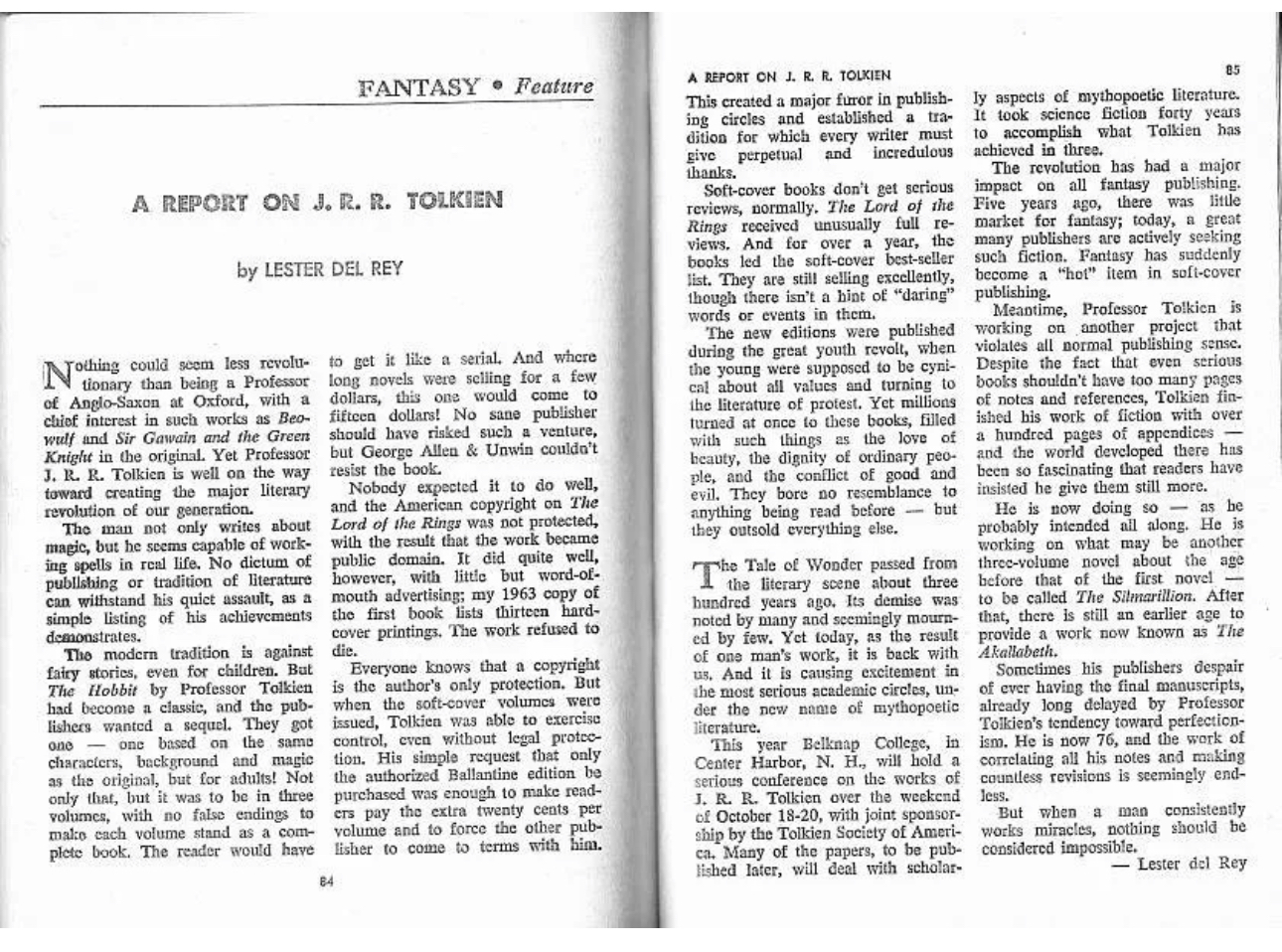
What a lovely article Lance! Thank you for sharing.
Some of those hints at works to come can seem quite poignant from where we are now. Like the closing words of Auden's review of ROTK in the New York Times:
"The legends of [the First and Second Ages] are, I understand, already written and I hope that, as soon as the publishers have seen The Lord of the Rings into a paper-back edition, they will not keep Mr. Tolkien's growing army of fans waiting too long."
Some of those hints at works to come can seem quite poignant from where we are now. Like the closing words of Auden's review of ROTK in the New York Times:
"The legends of [the First and Second Ages] are, I understand, already written and I hope that, as soon as the publishers have seen The Lord of the Rings into a paper-back edition, they will not keep Mr. Tolkien's growing army of fans waiting too long."
Jumping forward to late 1977 / early 1978 - an interesting review of The Silmarillion appeared in Galaxy Science Fiction.
Paul Walker said "my very subjective impression is that it is better" (than LOTR). He found a lot of LOTR "tedious" but "was never bored with The Silmarillion for a minute. It has so much charm and excitement; imagination and invention."
That said, Walker sees fundamental shortcomings in "imitating pre-Christian literature with the intellect and imagination of a middle-class Victorian". He goes on to say that "it is not more than a wonderful story. The essence of the greatness of the material is missing; those elements of the tragic and the terrible and the sensual". It is an essential Englishness (as opposed to a universal-ness) that Walker takes issue with: "I still love Tolkien. But The Silmarillion, like LoTR, is to be seen for what it is: an English fairy tale about Englishmen. And nothing more."
Paul Walker said "my very subjective impression is that it is better" (than LOTR). He found a lot of LOTR "tedious" but "was never bored with The Silmarillion for a minute. It has so much charm and excitement; imagination and invention."
That said, Walker sees fundamental shortcomings in "imitating pre-Christian literature with the intellect and imagination of a middle-class Victorian". He goes on to say that "it is not more than a wonderful story. The essence of the greatness of the material is missing; those elements of the tragic and the terrible and the sensual". It is an essential Englishness (as opposed to a universal-ness) that Walker takes issue with: "I still love Tolkien. But The Silmarillion, like LoTR, is to be seen for what it is: an English fairy tale about Englishmen. And nothing more."
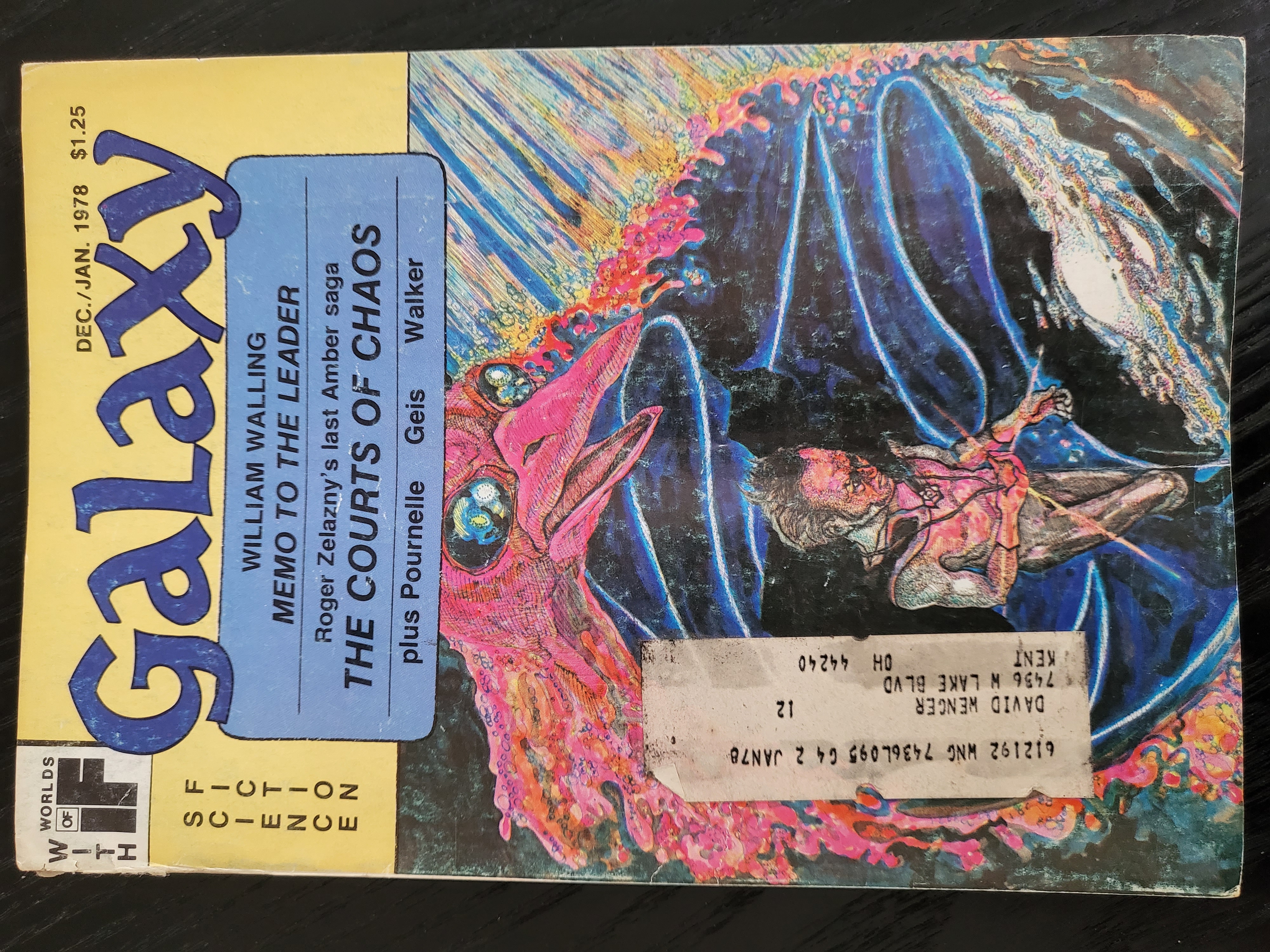
Jumping back - way back - this is by far the earliest review I've picked up.
In the Canadian Forum magazine of November 1925 is a short review of the Tolkien/Gordon edition of Sir Gawain and the Green Knight.
"The text is so difficult that it cannot be read without considerable knowledge of Middle English...but the editors have supplied all the necessary apparatus for the reading of the text and for the study of the dialect."
"The masses of critical and linguistic material are well arranged and students of the English language who master a quarter of the contents of this volume will be able to read with ease in the whole field of medieval English literature."
In the Canadian Forum magazine of November 1925 is a short review of the Tolkien/Gordon edition of Sir Gawain and the Green Knight.
"The text is so difficult that it cannot be read without considerable knowledge of Middle English...but the editors have supplied all the necessary apparatus for the reading of the text and for the study of the dialect."
"The masses of critical and linguistic material are well arranged and students of the English language who master a quarter of the contents of this volume will be able to read with ease in the whole field of medieval English literature."
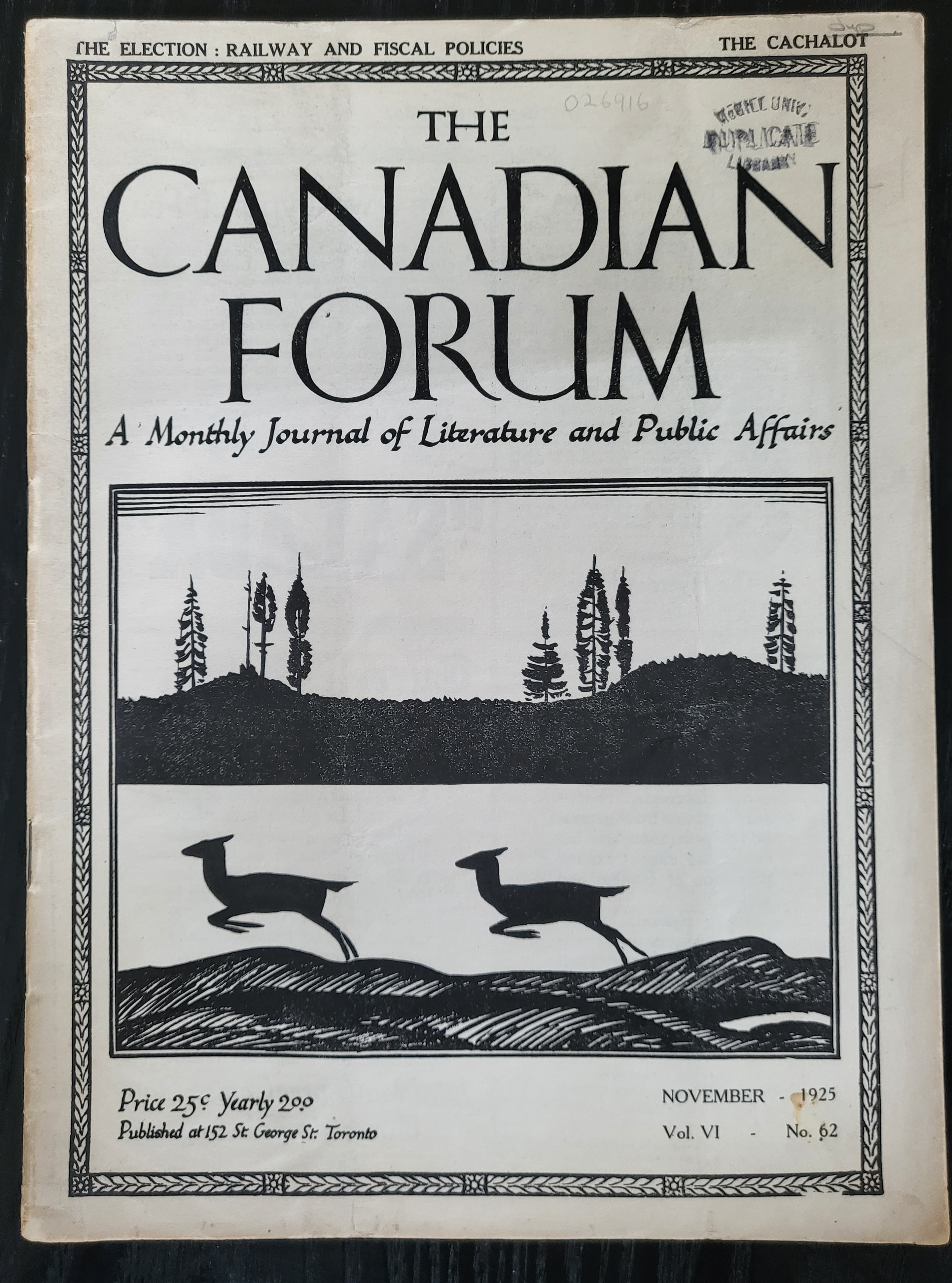
Can you add an image of the review, this should be Public Domain in the USA, so no problems with copyright that I am aware of?
Thanks for continuing with these, always interesting to see items like this.
Thanks for continuing with these, always interesting to see items like this.
Two earlier reviews can be found in Notes and Queries
27 May 1922 on A Middle English Vocabulary. https://archive.org/details/sim_notes- ... ge/420/mode/2up?q=Tolkien
30 May 1925 on Sir Gawain and the Green Knight. https://archive.org/details/sim_notes- ... ge/n19/mode/2up?q=Tolkien
27 May 1922 on A Middle English Vocabulary. https://archive.org/details/sim_notes- ... ge/420/mode/2up?q=Tolkien
30 May 1925 on Sir Gawain and the Green Knight. https://archive.org/details/sim_notes- ... ge/n19/mode/2up?q=Tolkien
Trotter wrote:
Can you add an image of the review, this should be Public Domain in the USA, so no problems with copyright that I am aware of?
Thanks for continuing with these, always interesting to see items like this.
Yeah I don't plan to stop anytime soon

And thanks zionius for sharing those.
The New York Review of Books had a review of The Silmarillion by Robert M. Adams in its issue of 24 November 1977. In fact the review - which is rather lengthy - takes a somewhat retrospective view, looking at a variety of themes and characteristics of The Hobbit and LOTR as well.
It falls firmly into the negative camp (as regards The Silmarillion) with the familiar criticism that the work is "an empty and pompous bore." Adams seems rather irked by the volume of names ("the effect is an irritating blur") though at the same time acknowledging the strength of the creativity that lies behind them ("the names are also a good part of the book's reward"). I have no wish to argue for or against the merits of the work, though I am interested to learn how accurate is the claim that "hardly anybody has had a good word to say [about it]".
While the (more positive) views of Adams on the earlier works are interesting, coming so many years after publication, I won't dwell on them here - but one particular choice of words may reveal something of the geopolitical mood of the time, where it is noted that in LOTR, civilisation is "threatened by a dark, mechanical, collectivist tyranny from the east." If I may hazard an opinion, Sauron was no collectivist...
It falls firmly into the negative camp (as regards The Silmarillion) with the familiar criticism that the work is "an empty and pompous bore." Adams seems rather irked by the volume of names ("the effect is an irritating blur") though at the same time acknowledging the strength of the creativity that lies behind them ("the names are also a good part of the book's reward"). I have no wish to argue for or against the merits of the work, though I am interested to learn how accurate is the claim that "hardly anybody has had a good word to say [about it]".
While the (more positive) views of Adams on the earlier works are interesting, coming so many years after publication, I won't dwell on them here - but one particular choice of words may reveal something of the geopolitical mood of the time, where it is noted that in LOTR, civilisation is "threatened by a dark, mechanical, collectivist tyranny from the east." If I may hazard an opinion, Sauron was no collectivist...
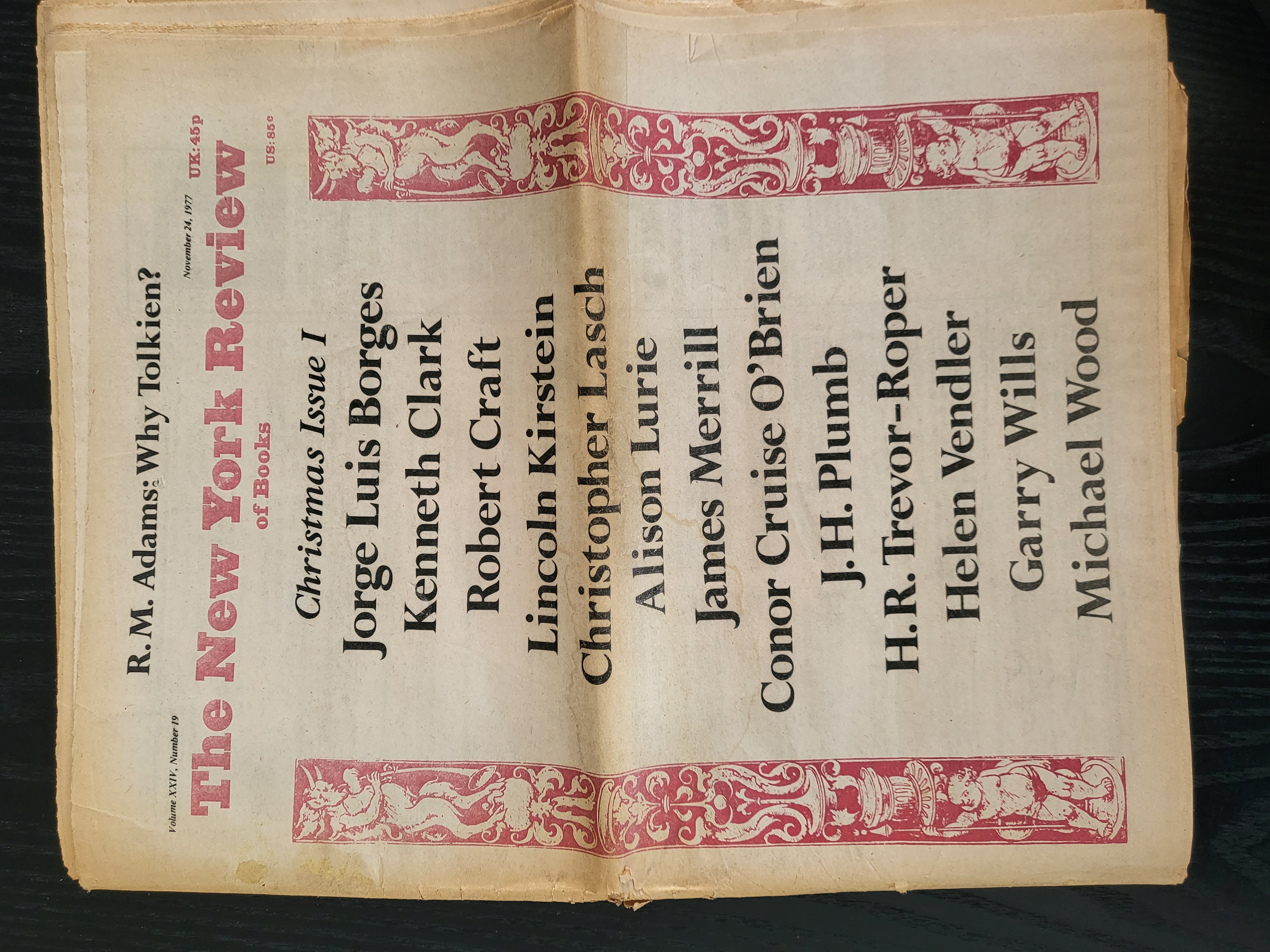
I can share a lovely review that I've just picked up - it's on p.4 of The Yorkshire Post on 12 August 1925, in a section headed (rather delightfully) "The Library Table".
This review of the Tolkien/Gordon edition of Sir Gawain and the Green Knight gives a brief but evocative background to the manuscript origin ("the writing is small, the ink has faded considerably, and some lines were blotted against the opposite page, when the manuscript was written"). There is also an overview of the various tools that support the reader.
This review of the Tolkien/Gordon edition of Sir Gawain and the Green Knight gives a brief but evocative background to the manuscript origin ("the writing is small, the ink has faded considerably, and some lines were blotted against the opposite page, when the manuscript was written"). There is also an overview of the various tools that support the reader.
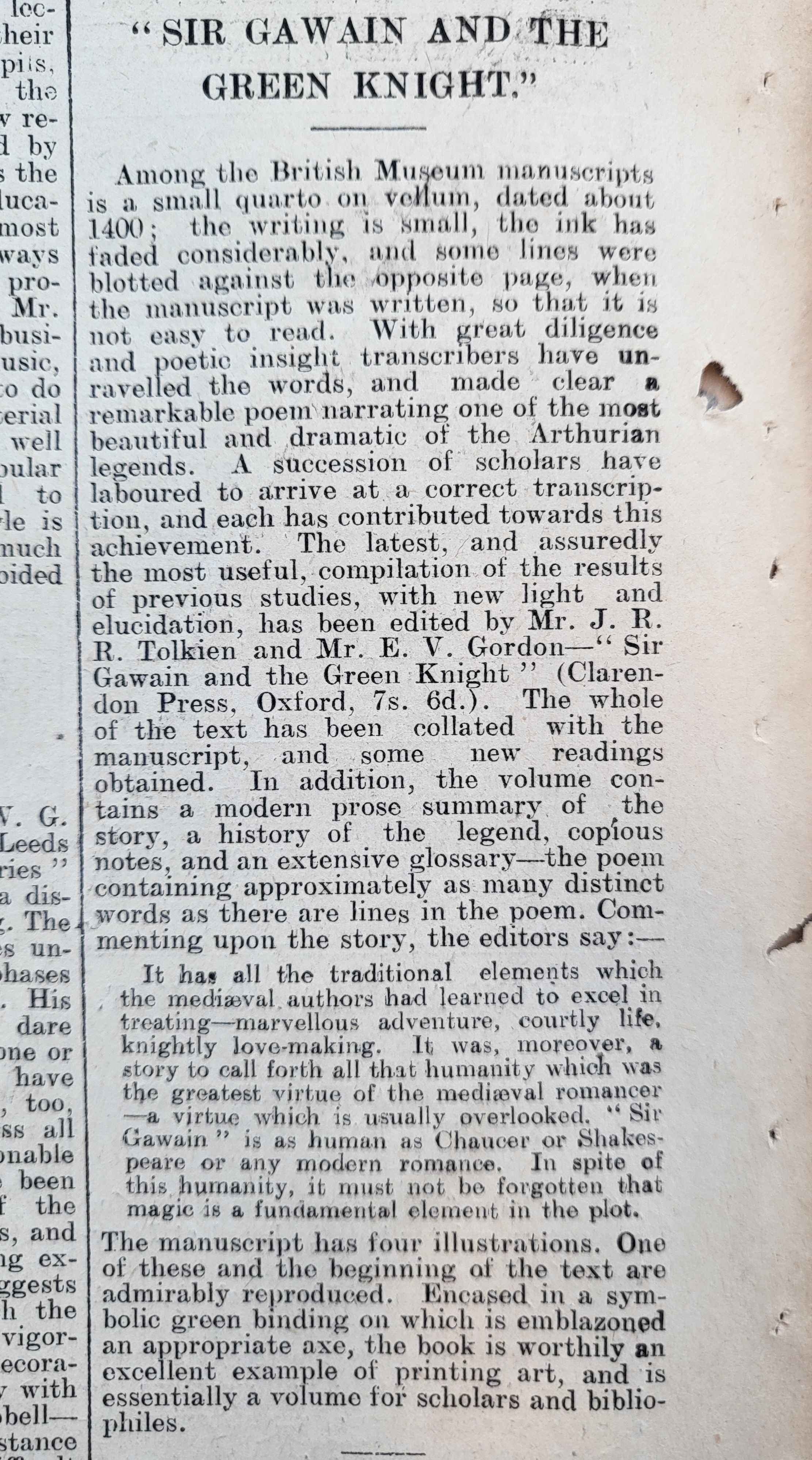
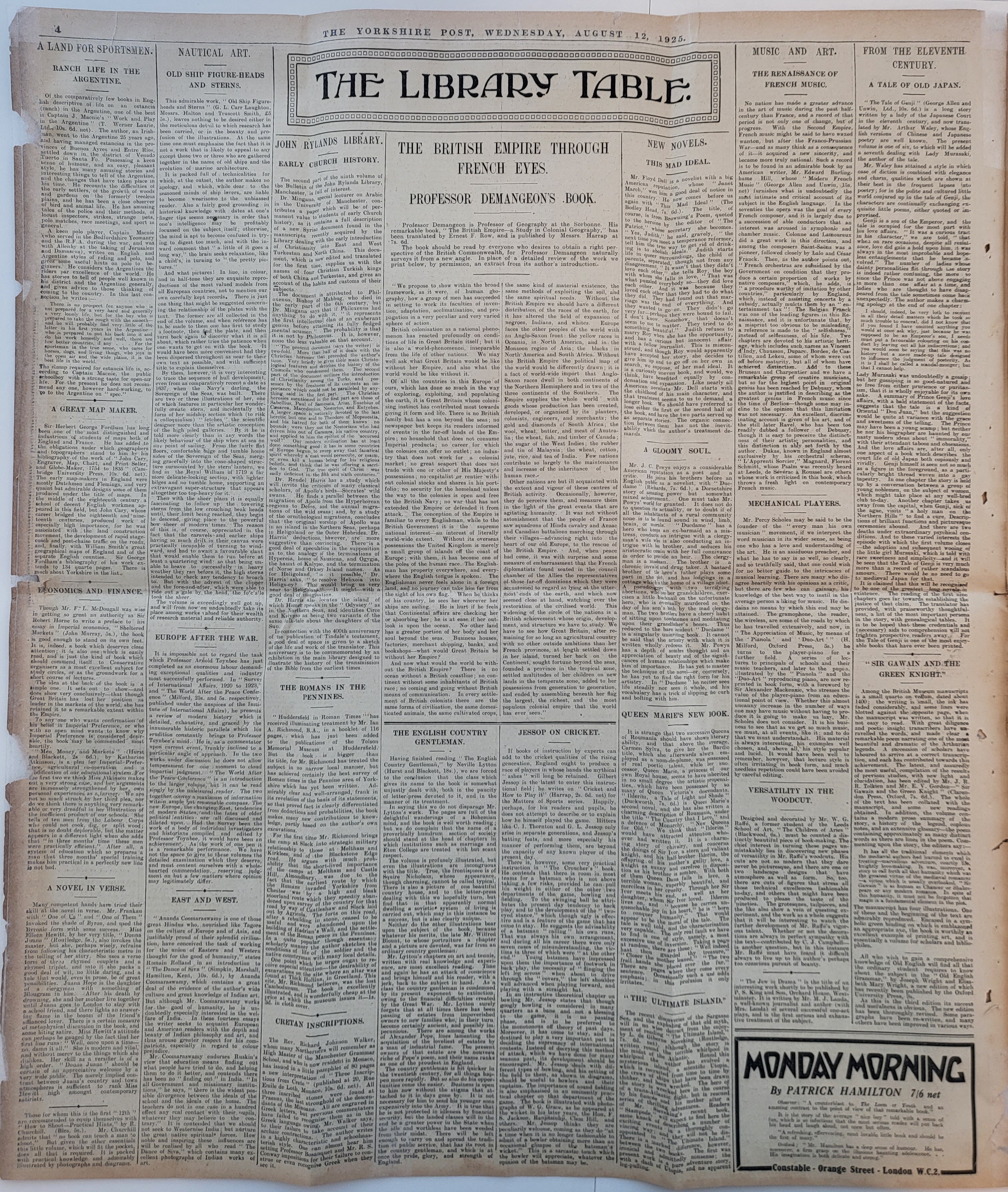









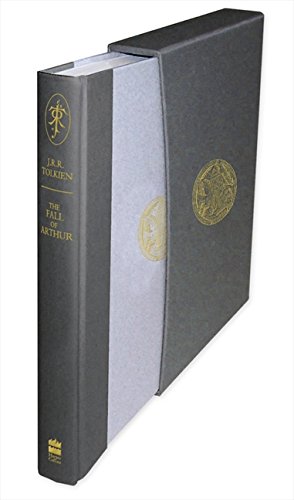
 2471
2471 1.09M
1.09M